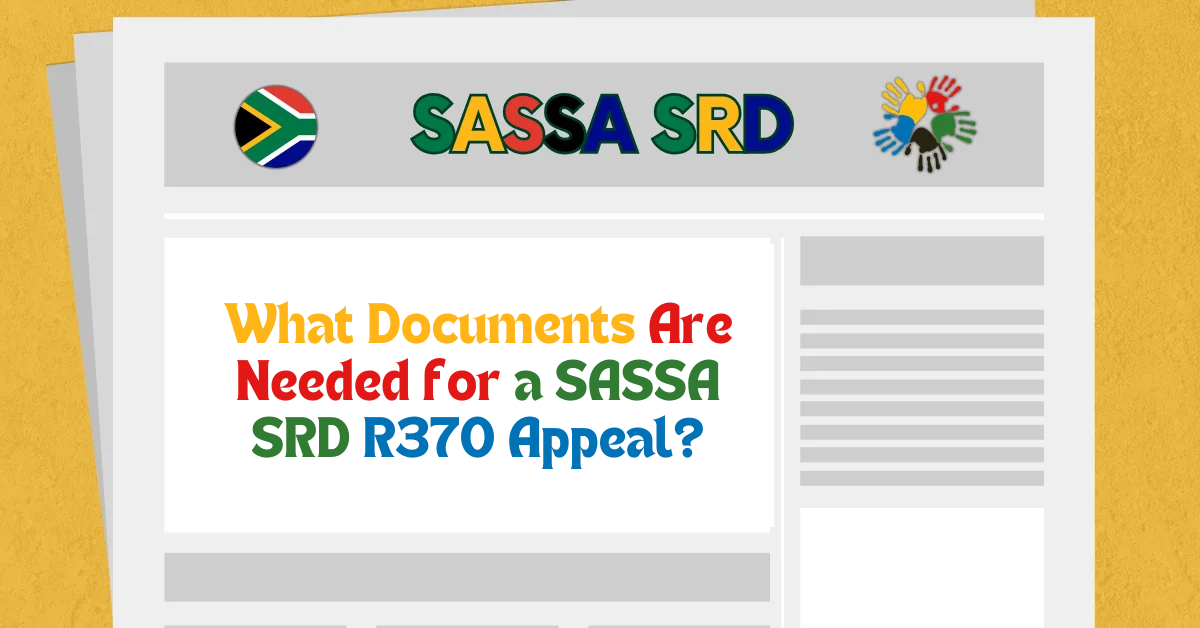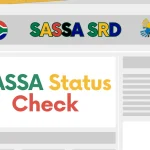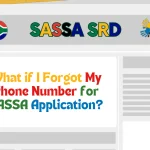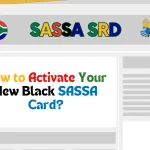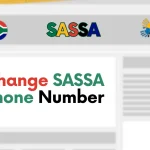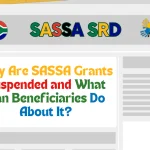Have you recently applied for the SASSA SRD R370 grant and received an unsuccessful outcome? Or perhaps you’re frustrated because your appeal for the SRD grant was rejected, and you’re unsure about what documents are required for your SASSA SRD R370 appeal in 2025? If so, you’re not alone. Many applicants face challenges during the application process, especially when it comes to appealing a rejected grant. However, understanding the documentation needed for the appeal process is key to ensuring that your case is reviewed and reconsidered efficiently.
In this guide, we’ll walk you through everything you need to know about what documents are required for a successful SASSA SRD R370 appeal in 2025.
What Documents Are Needed for a SASSA SRD R370 Appeal in 2025? (Quick Answer)
To appeal a rejected SASSA SRD R370 grant in 2025, you’ll need to submit essential documents including proof of identity (ID or passport), bank account details, proof of income or financial status, proof of address (e.g., utility bill or lease), and tax records (if applicable). Ensure that all information is accurate and matches your original application for a successful appeal.
Why You May Need to Appeal Your SASSA SRD R370 Grant Application?
Before we dive into the documents required, let’s quickly look at some common reasons why you might need to appeal your SASSA SRD R370 grant application in 2025. Understanding these reasons can help you determine whether an appeal is necessary:
- Eligibility Issues: SASSA may deem you ineligible due to incorrect or outdated information, such as an incorrect ID number, employment status, or other personal details.
- Documentation Errors: If your supporting documents are missing or incorrectly submitted, SASSA may reject your application.
- Income Discrepancies: If your income level is above the set threshold, your application may be rejected.
- Failed Biometric Verification: Issues related to biometric verification can lead to delays or denials in your grant application.
- Technical Glitches: Sometimes, system errors can lead to incorrect application rejections or errors in reviewing submitted documents.
If you find yourself in any of these situations, appealing your application is your best chance of resolving the issue.
What Documents Are Needed for a SASSA SRD R370 Appeal?
When you want to appeal the rejection of your SRD R370 grant, it’s essential to have the correct documentation to ensure your appeal is processed quickly. Below is a detailed breakdown of the documents you will need to provide:
1. Proof of Identity
The first and most important document you need is proof of your identity. This ensures that the application is linked to the correct individual. Acceptable documents include:
- South African Identity Document (ID): A valid, green, bar-coded South African ID or Smart ID card.
- Birth Certificate: If you don’t have an ID, a birth certificate can be used as an alternative.
- Passport: If you’re a foreign national applying for assistance, a valid passport is required.
- Smart ID Card: If you recently upgraded to a smart ID card, make sure it is provided.
Ensure that the ID provided is clear, legible, and not expired. If you’re using an expired ID or birth certificate, you may need to renew it before proceeding.
2. Proof of Banking Details
One of the most common reasons for SRD grant rejection is missing or incorrect banking details. To resolve this issue, provide proof of your bank account. You’ll need to submit:
- Bank Statement: A bank statement no older than three months to confirm the banking details associated with your grant payment.
- Bank Account Number: Ensure that the bank account number is correct and active. Double-check the account name and number to avoid errors.
This document verifies that you have a valid account to receive your SRD grant payment. Ensure the details are clear and legible.
3. Income Details/Proof of No Income
Another critical factor in determining eligibility for the SRD R370 grant is whether you are employed or have an income. If your application was rejected due to income-related issues, you may need to provide evidence of your income status. Required documents may include:
- Payslips or Bank Statements: These can show your monthly income and whether it exceeds the grant eligibility threshold.
- Affidavit of No Income: If you have no income, you may be required to submit a sworn affidavit stating that you do not earn an income.
- Letter of Employment: If you are employed, include a letter from your employer verifying your employment status and monthly salary.
For those who are unemployed or self-employed, an affidavit of no income or a statement showing that you are not earning an income may be required.
4. Proof of Address
SASSA requires applicants to submit proof of address to ensure that they are located within South Africa’s borders. The following documents can serve as proof of address:
- Utility Bill: A recent utility bill such as electricity, water, or a landline phone bill with your name and address on it.
- Lease Agreement: A valid lease agreement for those renting a home, with the address clearly stated.
- Bank Statement: Some bank statements include your residential address, which may be acceptable for proof.
Make sure the document you submit is recent and shows a clear and legible address.
5. Tax Records (if applicable)
If your application was rejected because SASSA suspects you may have a higher income than eligible, providing tax records could help your appeal. Required documents include:
- Tax Returns: If you are employed or self-employed, you may be asked to provide proof of tax returns for the last year.
- Tax Number: A copy of your tax registration documents can also help clarify your tax status.
If you are self-employed or running a small business, providing documentation that proves your tax status may be necessary.
6. Support Documents for Special Circumstances
In some cases, applicants may need to provide supporting documents for special circumstances. These documents may include:
- Medical Certificate: If you are claiming disability or special assistance, you may need to provide a medical certificate that outlines your health condition.
- Death Certificate: If you’re claiming for someone who has passed away, include a death certificate and any other relevant documents.
- Children’s Birth Certificates: If you’re a caregiver or guardian, providing birth certificates of children in your care may be needed.
Each of these documents supports your eligibility for the grant, helping to clarify your individual situation.
7. Affidavit (for discrepancies or corrections)
In the case of discrepancies in your information (e.g., mismatched details between your ID and application), you may need to submit an affidavit. This is a sworn statement that explains the issue and provides corrections. The affidavit can be obtained from any police station, and it must be signed in the presence of an authorized officer.
8. Appeal Form
The last piece of the puzzle is the appeal form itself. SASSA requires applicants to complete a detailed form explaining why they believe their application was incorrectly rejected and providing any new information or corrections. You can download the appeal form directly from the SASSA website or get it at your nearest SASSA office.
Make sure all fields are filled out accurately and truthfully.
How to Submit Your Appeal?
Once you have all the necessary documents in order, you can submit your appeal to SASSA. You can submit your appeal:
- Online: By logging into your SRD application account on the official SASSA website and uploading all the required documents.
- In-person: By visiting your nearest SASSA office and handing in the documents to the SASSA staff.
- Via Post: You can also mail your appeal and supporting documents to SASSA’s regional or local offices.
Make sure to keep a copy of everything you submit for your records.
Important Tips for a Successful SASSA SRD Appeal
- Double-check everything: Ensure that all documents are clear, legible, and up-to-date.
- Be truthful: Provide accurate information in your appeal form and affidavits.
- Submit on time: There are deadlines for submitting appeals, so be sure to act quickly once you have the necessary documents.
- Follow up: If you don’t hear from SASSA within the expected time frame, contact them to check the status of your appeal.
FAQS
1. What documents are required for a SASSA SRD R370 appeal?
To appeal your SASSA SRD R370 grant, you’ll need to submit key documents such as your South African ID, bank details, proof of address, proof of income (if applicable), and any supporting documents related to special circumstances, like medical certificates or children’s birth certificates.
2. How do I submit my SASSA SRD R370 appeal?
You can submit your appeal online via the SASSA website, in-person at your nearest SASSA office, or by mailing the necessary documents to SASSA’s regional or local office. Ensure that all documents are clear and legible.
3. What should I do if I have missing or incorrect documents for my appeal?
If any documents are missing or incorrect, make the necessary corrections and gather the correct documentation. If you are unable to obtain a document, consider submitting an affidavit explaining the issue.
4. How long does it take for SASSA to process my appeal?
The processing time for SASSA appeals can vary. Generally, you can expect a response within 30-60 days, but it’s important to follow up if you haven’t heard from them in the expected timeframe.
5. Can I appeal more than once if my SASSA SRD grant is denied again?
Yes, you can appeal a denial multiple times, as long as you can provide new or corrected information. Make sure that each appeal is supported by accurate documentation to avoid delays.
Final Thoughts
The appeal process for the SASSA SRD R370 grant may seem overwhelming, but by gathering the correct documents and following the right steps, you can increase your chances of success. From identity documents to proof of income, every piece of paperwork plays a crucial role in supporting your case. Don’t hesitate to contact SASSA for assistance if needed, and always ensure that your documents are accurate and up-to-date. By preparing thoroughly, you can help ensure that your appeal is reviewed quickly and fairly.
Contents
- 1 What Documents Are Needed for a SASSA SRD R370 Appeal in 2025? (Quick Answer)
- 2 Why You May Need to Appeal Your SASSA SRD R370 Grant Application?
- 3 What Documents Are Needed for a SASSA SRD R370 Appeal?
- 4 How to Submit Your Appeal?
- 5 Important Tips for a Successful SASSA SRD Appeal
- 6 FAQS
- 6.1 1. What documents are required for a SASSA SRD R370 appeal?
- 6.2 2. How do I submit my SASSA SRD R370 appeal?
- 6.3 3. What should I do if I have missing or incorrect documents for my appeal?
- 6.4 4. How long does it take for SASSA to process my appeal?
- 6.5 5. Can I appeal more than once if my SASSA SRD grant is denied again?
- 7 Final Thoughts
